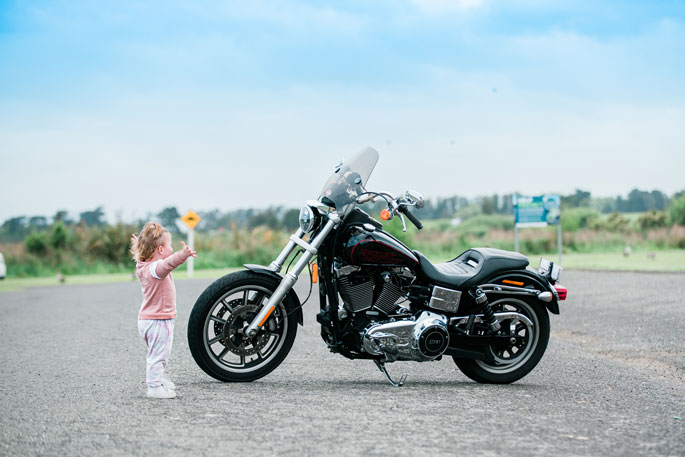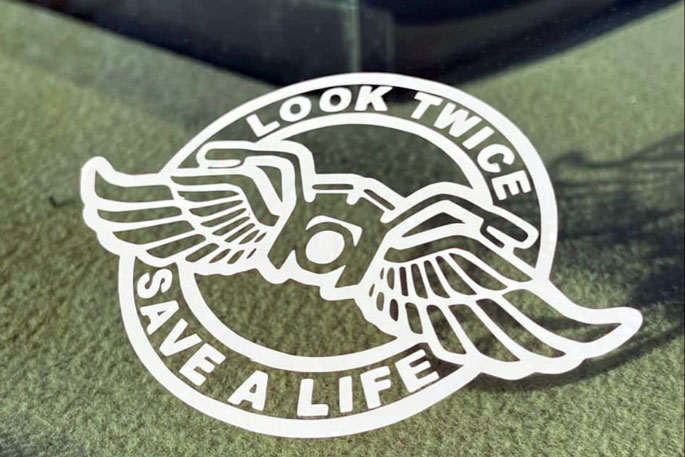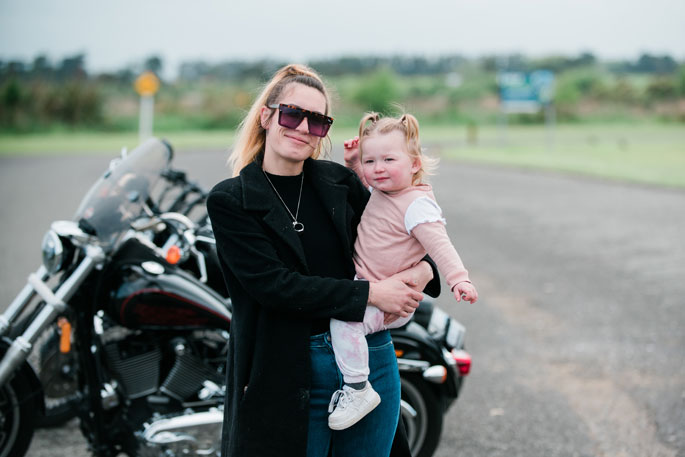Kavana Jane says the pain of losing a loved one to a motorbike accident never goes away.
In August the 25-year-old commemorated the four year anniversary of her fiancé Lance Bell being killed in a motorbike crash in 2020.
Jane and her daughter Harley-Jean, four, marked the day by placing flowers on the cross at the crash site.
“I still miss him every day,” she said. “People say that it gets easier in time, but it doesn’t. In that moment I lost my partner, Harley’s dad and our future together as a family.
“Harley-Jean lost the chance for her dad to be around for all of the important moments in her life. His chance to be her dad was ripped away.”
Bell, 29, was riding his Harley-Davidson to work in Palmerston North from Levin on the morning of August 6.
The accident reports outlined the driver was on a learner’s driving licence and should not have been behind the wheel. She turned across State Highway 56 into his path.
Jane has started her own local campaign. She has made car stickers which read ‘Look Twice, Save a Life’, framed by a logo that is an angel wings off a motorbike.
“Creating this sticker has healed a little part of me, that part that’s screaming ‘Look Twice’ every time I see a bike,” she said.
“When a biker approaches, I can assure you they smile seeing it and know, you’re not a threat.
“If there’s one thing to take from Lance’s accident – look twice, it most definitely can save a life and family suffering.”
For Jane the memories of that fateful day are hard to escape.
She woke up at 7.45am to the sound of banging on her front door and she knew straight away something was wrong.
 Photo: Julia Sabugosa.
Photo: Julia Sabugosa.
Her neighbour was at the door and informed Jane that her husband had just driven past a serious accident on State Highway 1 and could make out Bell’s bike.
Jane’s worst fears were soon confirmed.
Bell was taken by ambulance to Palmerston North Hospital and was in a critical condition.
His heart went into cardiac arrest at 5:30pm, around 10 hours after the crash and he had two emergency operations.
“At that stage I was told Lance wasn’t going to make it through another hour and it was probably best to turn the life support off. It was the worst decision I’ve ever had to make.”
She wants to tell her story to help others.
 The stickers that Kavana Jane has made to encourage drivers to ‘Look Twice’ on the roads.
The stickers that Kavana Jane has made to encourage drivers to ‘Look Twice’ on the roads.
“Lance’s death shows the need for all New Zealanders to make better decisions on our roads. They are dangerous places.
“If the driver had just taken another second, just to think about pulling out, he would’ve passed by the time she had thought about it.”
In 2023, ACC accepted 4487 motorbike related injuries at a cost of $133 million to help recover. This was the highest number of injuries and the highest cost in the past five years.
ACC data shows that 21 New Zealanders died in a motorbike accident in 2023 and so far in 2024 (up until 23 July), there have been 12 fatalities.
ACC injury prevention programme lead James Whitaker says motorbike riders and car drivers are both responsible for reducing motorcycle fatalities and injuries.
“We are still not getting the message,” he says.
Riders need to make sure their gear and bikes are in good condition before hitting the roads, while car drivers should keep an eye out for motorcyclists, particularly at intersections.
From 2016 to 2020 there were 2758 crashes involving a motorcycle or moped at urban intersections, Waka Kotahi (NZ Transport Agency) data shows. Of those, 538 involved serious injury and there were 38 fatalities.
Car drivers are at fault in 90 per cent of crashes between cars and motorbikes at urban intersections, Ministry of Transport figures show.
“We’ve all got to be more aware of the dangers at intersections,” Whitaker says.
“Look again for motorcyclists, not just the gap. Be aware of your blind spots.”
Jane said her partner was a big advocate for the ACC Ride Forever injury prevention programme.
“Lance found it invaluable,” she said. “I would 100 percent recommend for all riders to complete a Ride Forever course. He got great tips like traction in the wet and how to manage his bike.”
Riders who have completed a Ride Forever course are up to 50 percent less likely to lodge a motorcycle-related accident claim than non-trained riders.
More than 50 percent of motorcyclists de-register and put their bikes away over the winter months but that changes in spring.
“As we come into September, it’s a great time of year and we want motorbike riders to celebrate their love of riding,” says Whitaker.
“As you get back on the bike, make sure you’re ready to get the most out of the riding season.”
ACC recommends motorbike riders do three things:
- Check your bikes are well-maintained
- Ensure your gear is up to scratch
- Refresh your skills by completing an ACC Ride Forever coaching programme
For more visit: www.rideforever.co.nz
Kavana Jane says the pain of losing a loved one to a motorbike accident never goes away.
In August the 25-year-old commemorated the four year anniversary of her fiancé Lance Bell being killed in a motorbike crash in 2020.
Jane and her daughter Harley-Jean, four, marked the day by placing flowers on the cross at the crash site.
“I still miss him every day,” she said. “People say that it gets easier in time, but it doesn’t. In that moment I lost my partner, Harley’s dad and our future together as a family.
“Harley-Jean lost the chance for her dad to be around for all of the important moments in her life. His chance to be her dad was ripped away.”
Bell, 29, was riding his Harley-Davidson to work in Palmerston North from Levin on the morning of August 6.
The accident reports outlined the driver was on a learner’s driving licence and should not have been behind the wheel. She turned across State Highway 56 into his path.
Jane has started her own local campaign. She has made car stickers which read ‘Look Twice, Save a Life’, framed by a logo that is an angel wings off a motorbike.
“Creating this sticker has healed a little part of me, that part that’s screaming ‘Look Twice’ every time I see a bike,” she said.
“When a biker approaches, I can assure you they smile seeing it and know, you’re not a threat.
“If there’s one thing to take from Lance’s accident – look twice, it most definitely can save a life and family suffering.”
For Jane the memories of that fateful day are hard to escape.
She woke up at 7.45am to the sound of banging on her front door and she knew straight away something was wrong.
Her neighbour was at the door and informed Jane that her husband had just driven past a serious accident on State Highway 1 and could make out Bell’s bike.
Jane’s worst fears were soon confirmed.
Bell was taken by ambulance to Palmerston North Hospital and was in a critical condition.
His heart went into cardiac arrest at 5:30pm, around 10 hours after the crash and he had two emergency operations.
“At that stage I was told Lance wasn’t going to make it through another hour and it was probably best to turn the life support off. It was the worst decision I’ve ever had to make.”
She wants to tell her story to help others.
“Lance’s death shows the need for all New Zealanders to make better decisions on our roads. They are dangerous places.
“If the driver had just taken another second, just to think about pulling out, he would’ve passed by the time she had thought about it.”
In 2023, ACC accepted 4487 motorbike related injuries at a cost of $133 million to help recover. This was the highest number of injuries and the highest cost in the past five years.
ACC data shows that 21 New Zealanders died in a motorbike accident in 2023 and so far in 2024 (up until 23 July), there have been 12 fatalities.
ACC injury prevention programme lead James Whitaker says motorbike riders and car drivers are both responsible for reducing motorcycle fatalities and injuries.
“We are still not getting the message,” he says.
Riders need to make sure their gear and bikes are in good condition before hitting the roads, while car drivers should keep an eye out for motorcyclists, particularly at intersections.
From 2016 to 2020 there were 2758 crashes involving a motorcycle or moped at urban intersections, Waka Kotahi (NZ Transport Agency) data shows. Of those, 538 involved serious injury and there were 38 fatalities.
Car drivers are at fault in 90 per cent of crashes between cars and motorbikes at urban intersections, Ministry of Transport figures show.
“We’ve all got to be more aware of the dangers at intersections,” Whitaker says.
“Look again for motorcyclists, not just the gap. Be aware of your blind spots.”
Jane said her partner was a big advocate for the ACC Ride Forever injury prevention programme.
“Lance found it invaluable,” she said. “I would 100 percent recommend for all riders to complete a Ride Forever course. He got great tips like traction in the wet and how to manage his bike.”
Riders who have completed a Ride Forever course are up to 50 percent less likely to lodge a motorcycle-related accident claim than non-trained riders.
More than 50 percent of motorcyclists de-register and put their bikes away over the winter months but that changes in spring.
“As we come into September, it’s a great time of year and we want motorbike riders to celebrate their love of riding,” says Whitaker.
“As you get back on the bike, make sure you’re ready to get the most out of the riding season.”
ACC recommends motorbike riders do three things:
- Check your bikes are well-maintained
- Ensure your gear is up to scratch
- Refresh your skills by completing an ACC Ride Forever coaching programme
For more visit: www.rideforever.co.nz



0 comments
Leave a Comment
You must be logged in to make a comment.